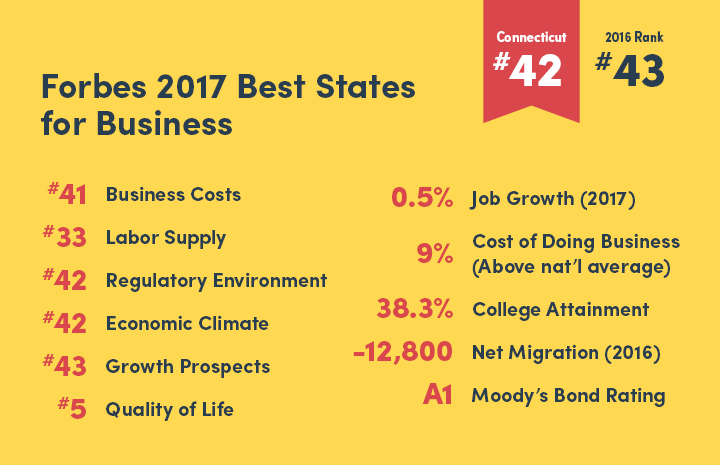Policymakers Propose Paid Sick Leave Mandate Expansion

Connecticut lawmakers will consider a massive expansion of the state’s paid sick leave mandate this year, with costly consequences for small and large businesses.
HB 5044 expands the state’s paid sick leave mandate to businesses with 20 or more employees—including manufacturers and certain nonprofits, including YMCAs, which were previously exempt.

Competitive disadvantage: Connecticut business costs are 9% above the national average.
In 2011, Connecticut became the first state in the country to adopt paid sick leave, after legislation narrowly passed the state House and Senate.
That legislation mandated that certain non-manufacturing businesses with at least 50 employees provide each service worker with up to five days of leave annually to care for their own or a child’s illness.
Wrong Prescription
Under the governor’s new bill, the mandate now extends to all employees—not just service workers as the current law requires—at businesses with 20 or more employees.
HB 5044 also changes the definition of a child from an individual who is under 18 years old to one who is under 26—beyond the age commonly considered as adulthood.
Expanding the mandate represents significant additional costs to every Connecticut business, and it’s certainly not the right prescription as the state’s economy and job growth continue to trail the region and the country.
In 2011, advocates of the current law insisted it would be good for business and have little impact on the bottom line.
In reality, the bill was such an administrative nightmare that businesses had to lobby for reforms in years immediately following the its passage.
Advocates promised businesses would see a decline in workplace illnesses and employee turnover following the law’s implementation in January, 2012. But studies disproved that claim, showing no evidence to support these claims.
Paid Sick Leave Compliance Drives Up Costs
Several years ago, a Freedom Foundation report reviewed the findings of other studies of municipal and state paid sick leave laws across the nation, including Connecticut’s mandate.
This “study of studies” found no evidence, even in studies conducted by groups who support paid sick leave initiatives, that the policies yielded any of the positive health effects advocates promised.
They have, however, delivered a major dose of extra costs for businesses.
This is certainly not the right prescription as the state's economy and job growth continue to trail the region and the country.
For example, of employers targeted under the original statute, 89% already offered some level of annual sick leave. Of those, over 53% reported cost increases of 2% to 5% or more to comply with Connecticut's law.
In addition, more than 25% of surveyed businesses reduced employee hours or raised prices to compensate for the increased costs of the mandate.
Manufacturers, Small Businesses Targeted
And in all the studies examined by the foundation, there were no credible findings that paid sick leave laws reduced employee turnover or the frequency of employees coming to work sick.
Connecticut's paid sick leave law has not lived up to its promises, it has under delivered on public health benefits, and has resulted in additional costs for mid-sized businesses.
Given that experience, there is little reason to expand the law to cover every business in Connecticut—particularly small businesses that can least afford to absorb new costs, and manufacturers that struggle to remain competitive.
Connecticut's economy—fueled largely by the manufacturing sector—expanded in the third quarter last year, with manufacturers also driving much of the state's recent job growth.
At a time when companies are looking for stability and affordability to compete, sustain, and grow in Connecticut, this and the other workplace mandates are ill-timed and ill-advised.
For more information, contact CBIA's Eric Gjede (860.480.1784) | @egjede
RELATED
EXPLORE BY CATEGORY
Stay Connected with CBIA News Digests
The latest news and information delivered directly to your inbox.


